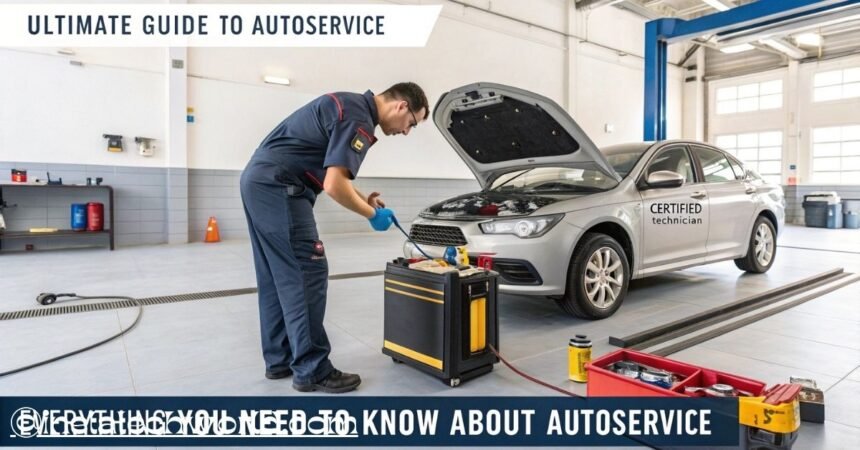When your car runs smoothly, it’s easy to forget that behind every purr of the engine is a routine of care and attention. Autoservice is like the healthcare system for your vehicle. It’s not just about fixing things when they break—it’s about preventing problems before they start. Whether it’s an oil change, a tire rotation, or a full diagnostic check, regular auto maintenance keeps your ride reliable, efficient, and safe.
Why Regular Auto Maintenance Matters
You wouldn’t skip your annual doctor checkup, right? Your car deserves the same kind of attention. Regular autoservice improves fuel efficiency, prevents breakdowns, and extends your car’s lifespan. It’s the secret sauce to avoiding massive repair bills down the road. Plus, a well-maintained vehicle keeps you and your passengers safer on the road.
Common Types of Autoservices
Oil Changes and Fluid Checks
Think of oil as your engine’s lifeblood. Without clean oil, your engine would grind to a halt—literally. Getting your oil changed every 3,000 to 7,500 miles (depending on your car) is non-negotiable. Fluid checks for coolant, brake fluid, transmission, and power steering fluid are equally important. Skipping them can lead to overheating, brake failure, or costly repairs.
Tire Services and Rotations
Your tires take a beating. Regular rotations help them wear evenly, which improves gas mileage and gives your tires a longer life. Autoservice centers also check tire pressure and alignment—both crucial for safe driving and saving money at the pump.
Brake Inspection and Repairs
Brakes are arguably the most important safety feature in your vehicle. If you hear squealing, grinding, or if your brake pedal feels “off,” it’s time to visit the shop. Brake pads, rotors, and brake fluid all need routine inspection to avoid dangerous situations.
Battery Testing and Replacement
A dead battery never comes at a convenient time. Most autoservice centers can test your battery in minutes. If it’s more than three years old, consider having it replaced. It’s a small price to pay for peace of mind—especially before a road trip.
Full-Service Auto Repair vs. Quick Service Shops
There’s a big difference between a full-service repair shop and a quick lube center. Quick shops are great for fast oil changes or wiper replacements. But for anything more complex—like transmission work or engine diagnostics—a full-service center is your best bet. They have specialized equipment and trained staff to handle it all.
How to Choose the Right Autoservice Center
Certified Technicians: Would you trust an unlicensed doctor? No way. The same goes for auto techs. Look for ASE (Automotive Service Excellence) certified technicians. It means they’ve passed rigorous exams and know what they’re doing.
Customer Reviews and Reputation: Before you hand over your keys, do a little homework. Google reviews, Yelp, and even social media can tell you a lot about a shop’s trustworthiness. Word-of-mouth referrals are golden.
Warranties and Guarantees: A reputable shop stands behind its work. Ask about warranties on parts and labor. If something goes wrong shortly after a service, you shouldn’t have to pay twice.
How Often Should You Service Your Car?
Every vehicle comes with a maintenance schedule in its manual. Typical intervals are 5,000, 15,000, 30,000 miles and so on. Following it can prevent major mechanical issues down the road. Changes in weather mean changes in how your car behaves. Before winter hits, check your battery, antifreeze, tires, and heater. Summer? Make sure the A/C is working and the engine isn’t overheating. Don’t ignore weird noises, vibrations, or dashboard warning lights. If your car starts handling differently, or if fuel economy suddenly drops, it’s your car telling you, “Hey, I need help!” The sooner you act, the better.
The Importance of Diagnostic Checks
Today’s vehicles are complex machines full of computers and sensors. A diagnostic scan can pinpoint problems fast, saving you time and money. Even if everything feels fine, it’s worth doing at least once a year or before a big trip.
Cost of Autoservice: What to Expect
Autoservice doesn’t have to cost an arm and a leg. Routine maintenance like oil changes or tire rotations are usually affordable. Major repairs, of course, come with a heftier price tag. But catching issues early through regular service is almost always cheaper than fixing a full-blown breakdown.
DIY Autoservice: What You Can and Can’t Do Yourself
Changing your wiper blades, topping off fluids, or replacing air filters? Totally doable for most folks. But things like brake work, suspension repair, or anything involving electronics should be left to the pros. One mistake could turn into a pricey disaster.
Autoservice Myths You Should Stop Believing
“Premium gas cleans your engine.” Nope. Unless your car requires it, you’re wasting money. “You have to go to the dealership to keep your warranty.” False—independent shops can service your car without voiding the warranty. “Oil needs to be changed every 3,000 miles.” Not always—modern oils can last much longer.
The Future of Autoservice: Electric and Hybrid Cars
Electric vehicles (EVs) are changing the game. Fewer moving parts mean less maintenance overall. But they still need brake inspections, tire care, and battery system diagnostics. Not every shop is equipped for EVs yet, so make sure yours is up to speed if you’ve gone electric.
How to Keep Maintenance Records
Always get a receipt and keep a log—digital or paper. It helps track what’s been done and when, and proves your car’s been well cared for. This can increase resale value and make warranty claims easier.
Conclusion
Taking care of your vehicle isn’t just about avoiding breakdowns—it’s about keeping you safe, saving money, and enjoying the ride. Autoservice might not be glamorous, but it’s essential. Whether you’re a DIY enthusiast or someone who leaves it to the pros, a little knowledge goes a long way. Stay on top of your car’s needs, and it’ll return the favor with years of reliable service.








